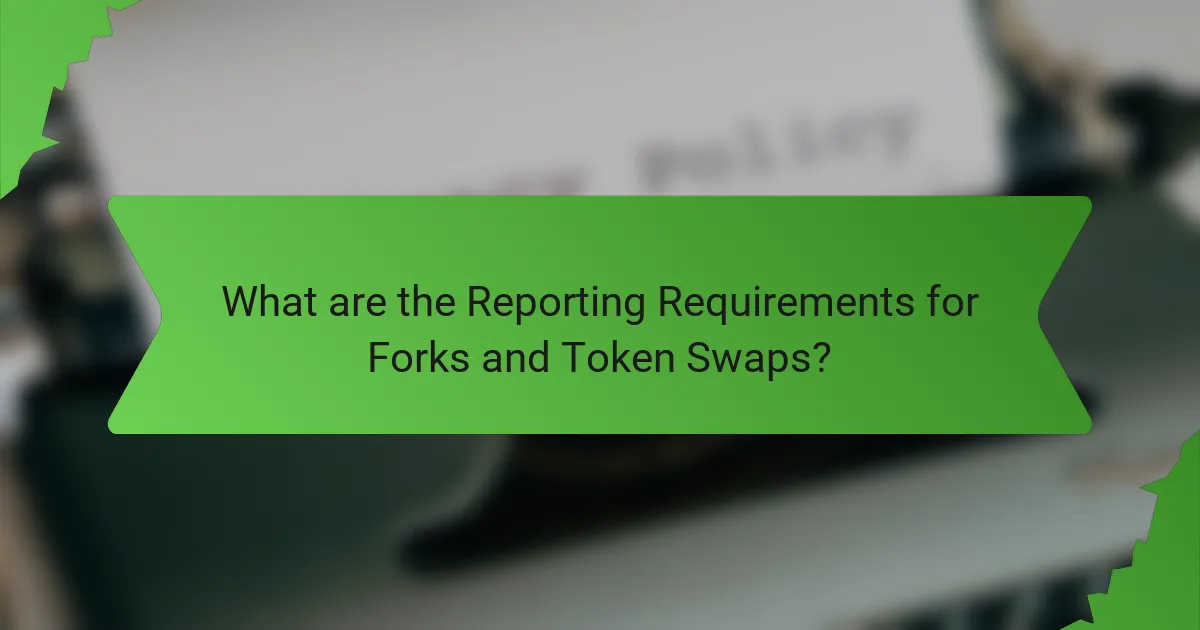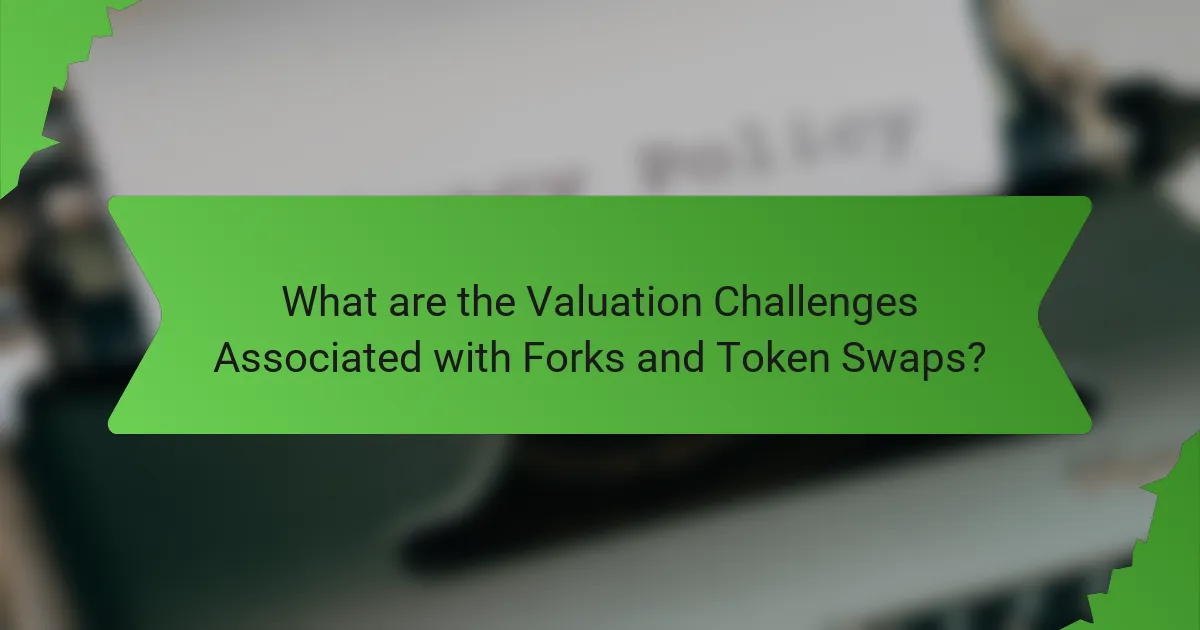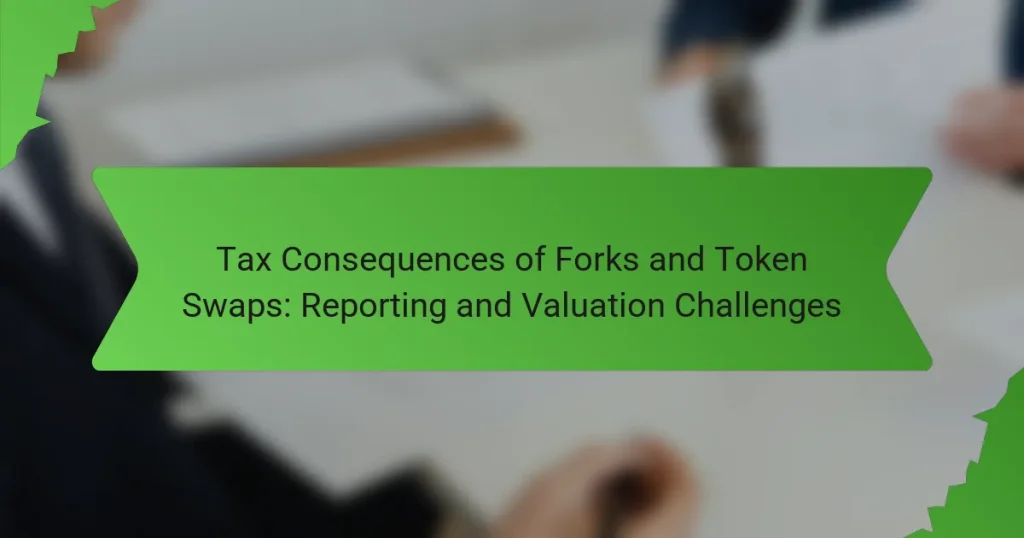The article addresses the tax consequences of cryptocurrency forks and token swaps, which are events that can create taxable situations for investors. When a fork occurs, the IRS classifies the newly received tokens as income at their fair market value, provided the taxpayer has control over them. Token swaps may also lead to taxation based on the gain or loss determined by the fair market value at the time of the exchange. Accurate record-keeping is critical for compliance, as taxpayers must report these transactions, and valuation challenges arise due to fluctuating market prices and limited historical data. Understanding these tax implications and reporting requirements is essential for individuals engaging in cryptocurrency transactions.

What are the Tax Consequences of Forks and Token Swaps?
Forks and token swaps can result in taxable events. When a fork occurs, the IRS treats it as income at the fair market value of the new tokens received. This is applicable if the taxpayer has control over the new tokens. Token swaps may also trigger taxation if the exchange results in a gain or loss. In these cases, the fair market value of the tokens at the time of the swap determines the taxable amount. Taxpayers must report these transactions on their tax returns. Accurate record-keeping is essential for compliance.
How do forks and token swaps occur in the cryptocurrency landscape?
Forks and token swaps occur through specific mechanisms in the cryptocurrency landscape. A fork happens when a blockchain diverges into two separate paths. This can be due to changes in protocol or governance decisions. For example, Bitcoin Cash emerged from Bitcoin in 2017 as a result of a hard fork. Token swaps involve exchanging one cryptocurrency for another, often due to a project upgrade or rebranding. An example is the swap from Ethereum’s original token to its ERC-20 standard tokens. Both processes can create new tokens, impacting holders’ portfolios and tax obligations. Tax authorities may view forks and token swaps as taxable events, requiring users to report gains or losses.
What types of forks exist and how do they differ?
There are two main types of forks: soft forks and hard forks. Soft forks are backward-compatible changes to a blockchain. They allow non-upgraded nodes to still validate transactions. Hard forks create a permanent divergence in the blockchain. They require all nodes to upgrade to the new version to continue participating.
Soft forks typically introduce new features without splitting the chain. They are often seen as less disruptive. Hard forks can lead to the creation of a new cryptocurrency. This occurs when a significant portion of the community disagrees with the changes.
Examples of soft forks include Bitcoin’s Segregated Witness (SegWit). An example of a hard fork is Bitcoin Cash, which split from Bitcoin in 2017. Each type of fork has different implications for users and developers. Understanding these differences is crucial for navigating tax consequences and reporting challenges.
What are the common scenarios for token swaps?
Common scenarios for token swaps include migrating to a new blockchain. This often occurs when a project upgrades its technology. Users exchange old tokens for new ones at a predetermined ratio. Token swaps also happen during mergers or acquisitions of blockchain projects. In these cases, one token may be replaced by another to consolidate assets. Additionally, token swaps can occur during initial coin offerings (ICOs) to facilitate fundraising. Users may swap tokens for equity or other digital assets. These scenarios highlight the dynamic nature of blockchain ecosystems.
Why is understanding tax consequences important for cryptocurrency investors?
Understanding tax consequences is crucial for cryptocurrency investors to avoid legal issues and financial penalties. Cryptocurrency transactions are subject to taxation under the Internal Revenue Service (IRS) guidelines. Failing to report gains can lead to audits and fines. Investors may face capital gains taxes on profits from trades. Additionally, forks and token swaps can complicate tax reporting. Each event may create taxable income, requiring careful valuation. Accurate record-keeping is essential for compliance. Knowledge of tax implications helps investors make informed decisions and optimize their financial outcomes.
How can tax implications affect investment strategies?
Tax implications can significantly affect investment strategies by influencing decision-making on asset allocation and timing. Investors must consider capital gains taxes when selling assets. Higher tax rates can discourage selling, leading to a hold strategy. Conversely, tax-loss harvesting can motivate selling underperforming assets to offset gains. Additionally, tax implications can affect the choice of investment vehicles, such as tax-advantaged accounts. Understanding tax brackets is crucial for optimizing investment returns. For example, long-term capital gains are often taxed at a lower rate than short-term gains. Thus, holding investments for over a year can be beneficial. Overall, tax considerations are essential in shaping effective investment strategies.
What are the potential financial risks of not reporting correctly?
Not reporting correctly can lead to significant financial risks, including penalties and interest charges. Tax authorities may impose fines for inaccuracies in reporting income or capital gains. These fines can accumulate quickly, increasing overall liability. Additionally, incorrect reporting may trigger audits, which can be costly and time-consuming. If discrepancies are found, taxpayers may owe back taxes, further increasing financial strain. In severe cases, criminal charges for tax evasion can arise, leading to legal fees and potential imprisonment. Accurate reporting is essential to avoid these severe financial consequences.

What are the Reporting Requirements for Forks and Token Swaps?
Reporting requirements for forks and token swaps vary by jurisdiction. Generally, taxpayers must report the fair market value of received tokens at the time of the event. This includes detailing the date of the fork or swap, the number of tokens received, and their value in relation to the original tokens. In the United States, the IRS treats forks as taxable events. Taxpayers should report gains or losses on their tax returns. Accurate record-keeping is essential for compliance. Failure to report can lead to penalties. Consult a tax professional for specific guidance based on individual circumstances.
How should cryptocurrency holders report forks and token swaps on their taxes?
Cryptocurrency holders should report forks and token swaps as taxable events. When a fork occurs, the holder receives new tokens. The fair market value of these new tokens at the time of receipt should be reported as income. For token swaps, the holder must calculate gains or losses based on the difference between the original token’s basis and the fair market value of the new tokens received. Both events require accurate record-keeping for tax purposes. The IRS treats these transactions similarly to sales or exchanges of property. Therefore, holders should consult tax professionals for specific guidance.
What forms are required for reporting these transactions?
Form 8949 is required for reporting transactions involving forks and token swaps. This form is used to report capital gains and losses from the sale or exchange of capital assets. Additionally, Schedule D must be filed alongside Form 8949. Schedule D summarizes the total capital gains and losses. Taxpayers must also keep detailed records of the transactions. Accurate reporting is essential to comply with IRS regulations. Failure to report correctly can result in penalties.
How do different jurisdictions handle reporting requirements?
Different jurisdictions have varying approaches to handling reporting requirements for tax purposes. In the United States, taxpayers must report forks and token swaps as taxable events, following IRS guidelines. The IRS treats these events as sales of property, requiring capital gains reporting. In contrast, the European Union has diverse regulations; countries like Germany consider forks as taxable income, while others may not have specific rules yet. Australia mandates that any capital gains from cryptocurrency transactions must be reported, including forks. Each jurisdiction’s tax authority provides specific guidelines that taxpayers must follow to ensure compliance.
What challenges do taxpayers face when reporting forks and token swaps?
Taxpayers face several challenges when reporting forks and token swaps. One primary challenge is determining the fair market value of the new tokens received during a fork. This value is crucial for accurate taxation. Additionally, taxpayers must navigate differing regulations across jurisdictions. Many taxpayers lack clear guidance on how to report these transactions. The timing of the transaction also complicates reporting, as it may affect the taxable event. Furthermore, record-keeping can be cumbersome due to the need to track multiple transactions. These complexities can lead to potential errors in tax filings.
How can the lack of guidance from tax authorities complicate reporting?
The lack of guidance from tax authorities complicates reporting by creating uncertainty in compliance requirements. This uncertainty can lead to inconsistent interpretations of tax obligations. Taxpayers may struggle to determine how to report forks and token swaps accurately. Inadequate guidance increases the risk of errors in reporting income or capital gains. These errors can result in penalties or audits by tax authorities. Furthermore, without clear rules, taxpayers may make decisions that could lead to unintended tax consequences. The absence of specific guidelines makes it difficult to establish a standardized approach to reporting. Overall, this lack of clarity hinders effective tax compliance and increases administrative burdens for taxpayers.
What are the common mistakes made in reporting these transactions?
Common mistakes made in reporting transactions related to forks and token swaps include failing to accurately track the basis of new tokens. Many individuals do not record the fair market value at the time of the transaction. This can lead to incorrect capital gains calculations. Another mistake is not reporting the receipt of new tokens as taxable events. Some individuals mistakenly believe that only selling tokens triggers a tax obligation. Additionally, individuals often overlook the impact of transaction fees on the overall reporting. Accurate reporting requires a complete accounting of all fees incurred. Lastly, many fail to maintain proper documentation for all transactions, making it difficult to substantiate claims during audits. Accurate records are essential for compliance with tax regulations.

What are the Valuation Challenges Associated with Forks and Token Swaps?
Valuation challenges associated with forks and token swaps include determining fair market value and addressing lack of historical data. Forks create new tokens that may not have established market prices. This complicates valuation as investors must estimate worth based on limited trading activity. Token swaps may involve exchanges of differing asset values, leading to potential miscalculations. Tax implications arise as valuation directly affects capital gains reporting. Accurate valuation is essential for compliance with tax regulations. The IRS requires taxpayers to report gains based on fair market value at the time of the event.
How do you determine the fair market value of newly acquired tokens?
To determine the fair market value of newly acquired tokens, assess the price at which similar tokens are traded. This can be done by analyzing current market prices on reputable exchanges. Look for the average price over a specific period, such as 24 hours or 7 days, to smooth out volatility. Additionally, consider the trading volume, as higher volumes often indicate more reliable price data. It is also essential to check for any recent news or events that may impact token value. These factors collectively help establish a fair market value for the newly acquired tokens.
What methods can be used to assess the value of tokens during a fork?
Market valuation is a primary method to assess the value of tokens during a fork. This method involves analyzing the trading price of tokens on various exchanges. Comparing prices across multiple platforms provides a more comprehensive valuation. Another method is the use of historical price data. This involves evaluating the token’s price trends prior to the fork. Additionally, assessing the underlying technology and project fundamentals can offer insights. Evaluating community sentiment and engagement is also crucial. Market capitalization can be calculated to determine the overall value of the token. These methods collectively help in establishing a fair value during token forks.
How does market volatility impact valuation during token swaps?
Market volatility significantly impacts valuation during token swaps. Fluctuating prices can lead to discrepancies in the perceived value of tokens being exchanged. For instance, if a token’s value drops sharply before a swap, the receiving party may end up with less value than anticipated. Conversely, if the token appreciates rapidly, it could result in overvaluation. Historical data shows that during periods of high volatility, token values can swing by over 20% within hours. This rapid change complicates the valuation process, making it challenging to establish a fair exchange rate. Accurate valuation is essential for tax reporting, as it determines the realized gains or losses during the swap. Thus, market volatility plays a critical role in the valuation accuracy of token swaps.
Why is accurate valuation critical for tax reporting?
Accurate valuation is critical for tax reporting because it determines the taxable income and capital gains. Tax authorities require precise valuations to assess the correct amount of tax owed. Inaccurate valuations can lead to overreporting or underreporting of income. This can result in penalties, interest, or audits from tax authorities. For example, the IRS mandates that taxpayers report gains based on fair market value at the time of a transaction. A study by the National Bureau of Economic Research emphasizes that misvaluations can significantly distort taxable income calculations. Thus, ensuring accurate valuation is essential for compliance and financial integrity in tax reporting.
What are the implications of misvaluing tokens on tax returns?
Misvaluing tokens on tax returns can lead to significant legal and financial repercussions. Incorrect valuations may result in underreporting or overreporting taxable income. Underreporting can lead to penalties, interest, and potential audits by tax authorities. Overreporting may cause taxpayers to pay more tax than necessary, leading to cash flow issues. Taxpayers may face challenges in substantiating their valuations during audits. Accurate token valuation is essential for compliance with IRS guidelines. The IRS requires taxpayers to report fair market value at the time of the transaction. Misvaluing tokens can also affect capital gains calculations, impacting overall tax liability.
How can taxpayers ensure they are valuing tokens correctly?
Taxpayers can ensure they are valuing tokens correctly by following market prices at the time of acquisition. They should track the fair market value of tokens using reliable cryptocurrency exchanges. Accurate valuation requires documenting the date and amount of each transaction. Taxpayers should utilize industry-standard valuation methods, such as the average price over a specific period. They can also refer to IRS guidelines on virtual currencies for compliance. Maintaining thorough records aids in substantiating the reported values during audits. Regularly updating valuations based on market fluctuations is essential for accuracy.
What best practices can help navigate tax consequences of forks and token swaps?
To navigate tax consequences of forks and token swaps, maintain detailed records of transactions. Document the date, value, and nature of each swap or fork. Understand that forks may create taxable events based on fair market value at the time of receipt. Token swaps can also trigger capital gains or losses. Consult tax professionals for personalized advice and compliance with local regulations. Utilize accounting software to track cryptocurrency holdings and transactions accurately. Stay updated on IRS guidelines regarding cryptocurrency taxation, as regulations may evolve.
The main entity of the article is the tax consequences associated with cryptocurrency forks and token swaps. The article provides a comprehensive overview of how these events are treated as taxable occurrences by tax authorities, particularly the IRS, necessitating accurate reporting and valuation. It outlines the different types of forks, scenarios for token swaps, and the challenges taxpayers face in determining fair market value. Additionally, it emphasizes the importance of record-keeping and understanding the implications of misreporting, while also offering best practices for navigating the complexities of tax compliance in the cryptocurrency landscape.




